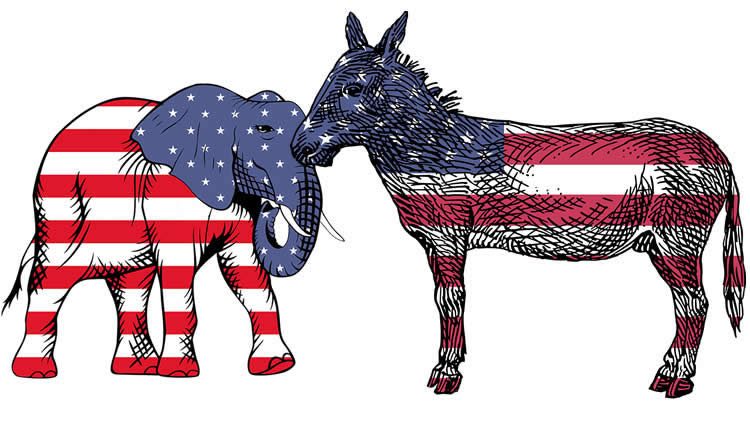Summary: Researchers report the outcome of the 2016 election had some unexpected outcomes when it comes to how people from one party affiliation treat people who have opposite views.
Source: Bocconi University.
After the unexpected results of the 2016 US Presidential Election, the way Americans treat each other changed as a function of their party affiliation, a new study by Celia Moore (Bocconi University) and colleagues, published in PLOS ONE, documents.
In a two-stage experimental study, they explored how Democrats and Republicans allocated resources to their political friends and foes before and after the election. A first group of 280 adult Americans made allocation decisions to groups with varied political affiliations before the final primaries and national conventions of both parties (May 3-8, 2016), when Hillary Clinton seemed poised to become President, and a second group of the same size and characteristics made the same set of decisions in the week after the election and its surprising outcome.
As party affiliation is a salient part of our social identity, especially around elections, authors expected that the results were experienced as an ego shock both by Democrats (negatively) and Republicans (positively). In particular, Democrats experienced the results as a threat, which undermines self-esteem and boosts in-group favoritism and out-group hostility.
In the pre-election stage of the experiment, people were asked their political affiliation and, then had to share a small sum of money with a group of three components, whose political affiliation was known. The groups could be composed of three political friends, two friends and an opponent, or two opponents and a friend. While Democrats would allocate around half the money to the rest of the group, irrespectively of their political affiliation, Republicans would yield significantly less money (around 36 cents on a dollar) to groups with one or two Democrats than to Republicans-only groups (58 cents).
After the election, participants were asked not only their party affiliation, but also a series of questions that measured their emotional reaction to the electoral outcome, their self-esteem and the strength of identification to their political party. Democrats were higher than Republicans in hatred, hostility, anger, fear, paranoia and suspicion and lower in self-esteem, and showed a behavior more similar to Republicans’ before the election, allocating 56 cents on a dollar to homogeneous groups and only 38 cents to groups with two Republicans. Republicans’ in-group favoritism and out-group hostility, on the other side, markedly softened (47 cents to Republicans-only groups and 41 cents to groups with two Democrats).

Statistical analysis confirmed that the effect was mediated by the fall (for Democrats) or rise (for Republicans) in self-esteem and that it was stronger in individuals with a stronger party identification.
“As subsequent surveys confirm that America remains deeply divided months after the election, the effects we have measured might be longer lasting than anyone might have expected”, Prof. Moore said.
Funding: This research was supported by the Bocconi University, London Business School.
Source: Fabio Todesco – Bocconi University
Publisher: Organized by NeuroscienceNews.com.
Image Source: NeuroscienceNews.com image is in the public domain.
Original Research: Open access research for “When the tables are turned: The effects of the 2016 U.S. Presidential election on in-group favoritism and out-group hostility” by Burak Oc, Celia Moore, Michael R. Bashshur in PLOS ONE. Published May 24 2018.
doi:10.1371/journal.pone.0197848
[cbtabs][cbtab title=”MLA”]Bocconi University “Electoral Outcomes Affect the Way We Treat Others.” NeuroscienceNews. NeuroscienceNews, 25 May 2018.
<https://neurosciencenews.com/electoral-outcomes-social-9146/>.[/cbtab][cbtab title=”APA”]Bocconi University (2018, May 25). Electoral Outcomes Affect the Way We Treat Others. NeuroscienceNews. Retrieved May 25, 2018 from https://neurosciencenews.com/electoral-outcomes-social-9146/[/cbtab][cbtab title=”Chicago”]Bocconi University “Electoral Outcomes Affect the Way We Treat Others.” https://neurosciencenews.com/electoral-outcomes-social-9146/ (accessed May 25, 2018).[/cbtab][/cbtabs]
Abstract
When the tables are turned: The effects of the 2016 U.S. Presidential election on in-group favoritism and out-group hostility
The outcome of the 2016 U.S. Presidential election was a big surprise to many, as the majority of polls had predicted the opposite outcome. In this two-stage cross-sectional study, we focus on how Democrats and Republicans reacted to this electoral surprise and how these reactions might have influenced the way they allocated resources to each other in small groups. We find that, before the election, Republicans showed greater in-group favoritism than Democrats, who treated others equally, regardless of their political affiliation. We then show that Democrats experienced the election outcome as an ego shock and, in the week following the election, reported significantly higher levels of negative emotions and lower levels of self-esteem than Republicans. These reactions then predicted how individuals’ decided to allocate resources to others: after the election, Republicans no longer showed in-group favoritism, while Democrats showed out-group derogation. We find these decisions when the tables were turned can be partially explained by differences in participants’ state self-esteem.







